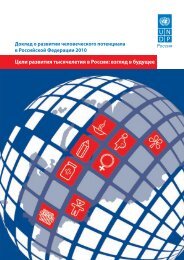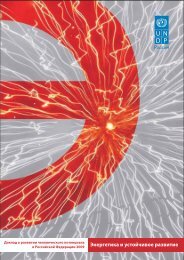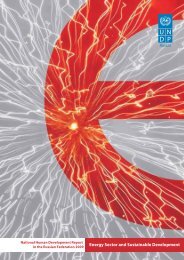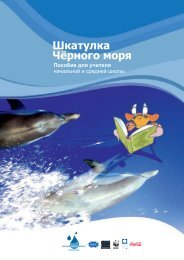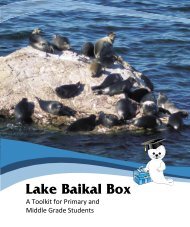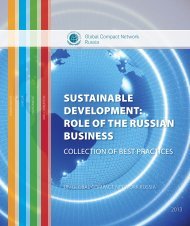Report - UNDP Russia
Report - UNDP Russia
Report - UNDP Russia
You also want an ePaper? Increase the reach of your titles
YUMPU automatically turns print PDFs into web optimized ePapers that Google loves.
GENERAL REVIEWChapter 1: The Energy Sector, theEconomy, and the Crisis surveys the impactof <strong>Russia</strong>’s energy sector on the country’ssocial, economic and human development.The world crisis, which entered its acute phasein the fall of 2008, has shown that <strong>Russia</strong>’seconomic recovery of the early 2000s was veryfragile. The country’s economy still has clearstructural disproportions, most obviouslydomination of the economy by the exportorientedfuel & energy sector. The statebudget, investments, and foreign trade are allstrongly dependent on the situation on worldenergy markets. Dominance of energyresourceexport in the national economy notonly makes it vulnerable to global shocks, butshackles its long-term economic growthpotential. Factors often grouped togetherunder the heading of the ‘resource curse’,including Dutch Disease and problemsassociated with resource rent, can suppressmotivation for investments in humandevelopment and its effective utilization bythe state, private business and ordinarypeople.Energy intensity of <strong>Russia</strong>’s GDP wasmuch lower in the economic rise of the 2000scompared with the early 1990s, and there hasbeen sustained progress towards greaterenergy efficiency, although dependence of thenational economy and budget incomes onenergy exports has increased. However, overallenergy efficiency in <strong>Russia</strong> remains lowcompared not only with developed countries,but also with developing countries. Thissituation dilutes relative advantages of the<strong>Russia</strong>n economy in the energy sector, creatingobstacles and postponing humandevelopment. Low energy efficiency anddominance of traditional energy carriers alsoleads to environmental impacts, creating publichealth hazards.There is a consensus among <strong>Russia</strong>nelites that sustainable development of <strong>Russia</strong>’seconomy can no longer be provided byextensive development of energy resources.The energy sector itself has shown worryingtendencies in the past two decades, notably aconstantly shrinking ratio of proven oil & gasreserves to production volumes.A goal-oriented governmentprogramme together with other changes,including some brought on by the internationalcrisis, could change the trajectory of thenational economy and open the way foralternative scenarios, which would prevent lossof human potential and help to achievesustainable growth.Fuel & energy specialization of theeconomies of some <strong>Russia</strong>n regions in the1990s served as a ‘safety cushion’ in a context ofoverall economic decline, but, with rareexceptions, did not become a factor of fast andsustainable economic development in thoseregions in the 2000s. These problems areanalyzed in Chapter 2: Energy Industry andthe Regions: Human DevelopmentChallenges. Fuel & energy regions remain themain donors to the national budget: the twoautonomous districts of Tyumen Regionprovide 29% of all taxes received by the federalbudget (the city of Moscow gives the sameamount). These two districts, with the highestoil & gas reserves in <strong>Russia</strong> and, consequently,high personal and budget incomes, stand outby their success in increasing life expectancy,reducing infant mortality and improving theirvocational education system. But high profitscannot cope with illnesses that depend on thestate of society: social environment andlifestyles need to be improved. Most fuel &energy regions cannot spend significantlymore on social programmes than regions,which lack fuel & energy resources, but whichobtain large-scale financial aid from the federalbudget. So specialization in fuel productiondoes not give major advantages in socialdevelopment.Decline of industrial output, caused bythe world crisis, has been less marked in fuel &energy regions than in other regions, but it hasnot been possible to avoid social impacts:budget incomes have fallen and half of the8 National Human Development <strong>Report</strong> in the <strong>Russia</strong>n Federation 2009



